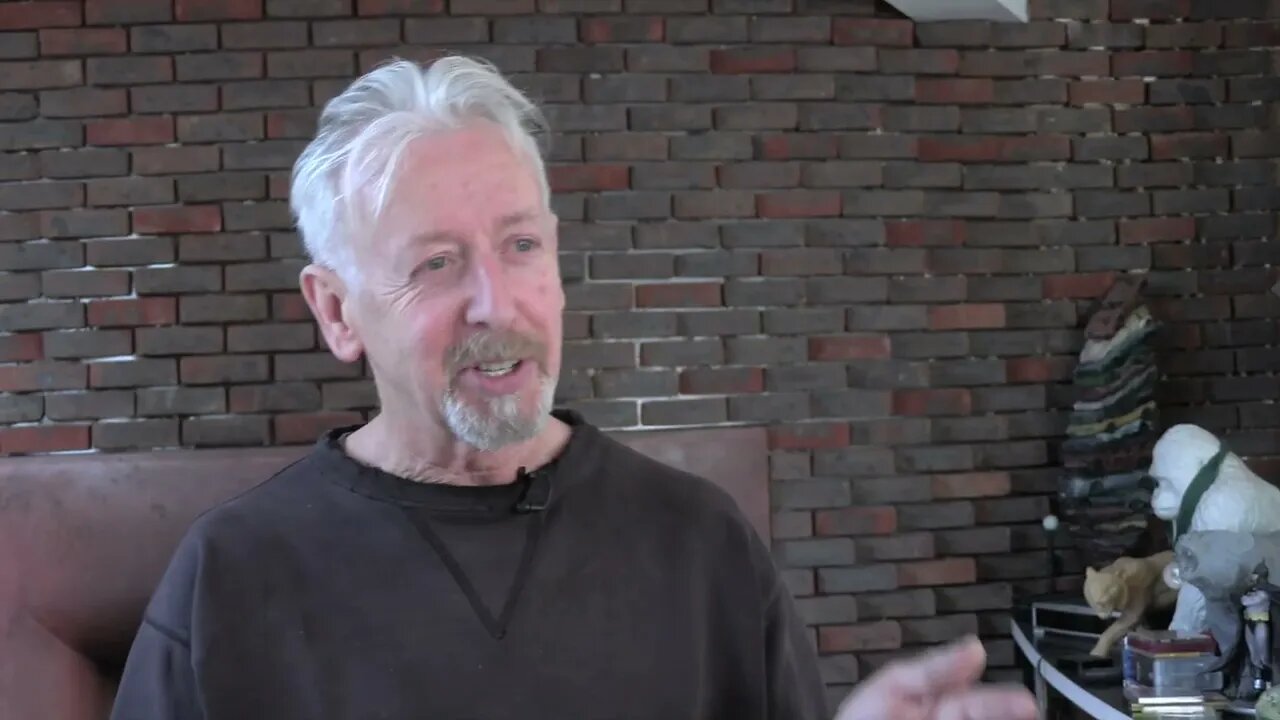Premium Only Content

David Mach – interview | London, 11 January 2023
‘I tried to make myself known as an ideas monger’
The Scottish artist discusses what fuels his inclination to work at scale and the importance of necessary extravagance when making art with the stuff of everyday life, from matches to shipping containers as well as architecture
David Mach (b1956, Fife) loves to work at scales many would consider unfeasible. In 1983, a year after graduating from the Royal College of Art, he recreated a life-sized Polaris submarine out of 6,000 rubber tyres behind London’s Royal Festival Hall. Although vast tonnes of magazines and newspapers became something of a trademark material – at the Gallery of Modern Art Glasgow in 2002, he used 15,000 copies of the Herald for his sculpture Bangers and Mash - he has deployed all manner of bulky everyday stuff in his sculptures and collages, including cars, furniture, shipping containers, aeroplanes and even a row of 12 toppling red telephone boxes. The latter piece, Out of Order (1989), still stands in Kingston’s shopping centre – now a poignant reminder of those simpler days when the only phones we used were attached to a piece of cable.
This penchant for the huge and unwieldy makes complete sense when you ask him where that impulse came from. As he reveals here, the Fife town where he was born, Methil, “was absolutely an amazing place to grow up”. Surrounded by 20th-century industry, with oil platforms visible out to sea, and components being constructed around the corner, he says that every day: “Something would come past the window of our house - the leg of an oil platform that was the length of three buses, with all these bits sticking off it.” In the 1960s and 70s, there was full employment, in mining, the oil industry, shipping and freight at Dundee’s active port. All this, he says, was “right on the doorstep of gorgeous countryside and stupendous beaches - the Riviera of Scotland”. He adds: “It gave me a sense of necessary extravagance. Let’s not be reasonable about this. Let’s go to town.”
That extravagance is palpable in Brick Train (1997), a life-sized replica of the 1938 steam locomotive Mallard, which made of bricks, clad in a billowing brick smoke cloak, sits next to Morrisons supermarket in Darlington, a celebration of the region’s railway heritage. Or in Big Heids (1999), a public sculpture in Lanarkshire, comprising three upturned shipping containers, each weighing 18 tonnes, in tribute to the now defunct steel industry. His last major solo London show, in 2017 at the Griffin Gallery, involved a new commission (Incoming, 2017) comprising a Jeep surfing on a tide of timber flotsam across shoulder-high drifts of carefully sculpted newspaper.
By the time he was nominated for the Turner Prize in 1988, he was up to his eyeballs in major, supersized commissions and so it continued until managing several simultaneous projects on multiple continents with diverse teams became too unwieldy. Around this time, Mach switched to a smaller – more collectable – scale, including his now famous/infamous matchhead sculptures, the first of which was accidentally set on fire by the collector who bought it. This led Mach to consider all future matchhead sculptures as performance art, liable to be (and even sometimes deliberately) set on fire.
Now, for his solo retrospective at the Pangolin gallery in London, he will combine the very large with the more moderate, in multiple maquettes. Heavy Metal will feature his high-profile installations as well as unrealised and monumental architectural projects, in locations as diverse as Edinburgh, Mauritius and Syria.
Mach studied fine art at Duncan of Jordanstone College of Art (now part of Dundee University) from 1974-79 and then the Royal College of Art (1979-82). On graduation, he was snapped up by the Lisson Gallery, which gave him his first solo show in 1982. Nominated for the Turner Prize in 1988, he didn’t win but was awarded the Lord Provost’s Prize in Glasgow in 1992. He was elected a Royal Academician in 1998, and an Honorary Member of the Royal Scottish Academy in 2004. He has been a professor of sculpture at the Royal Academy Schools, and a visiting professor of sculpture at Edinburgh College of Art. He lives and works in London.
David Mach: Heavy Metal
Pangolin London
25 January – 25 March 2023
Interview by VERONICA SIMPSON
Filmed by MARTIN KENNEDY
-
 10:05
10:05
DIY Wife
3 years agoHow We Flip Old Furniture For Profit!
76.3K62 -
 2:14:54
2:14:54
TheSaltyCracker
11 hours agoTrump Goes Gangster ReeEEeE Stream 01-26-25
171K337 -
 4:42:13
4:42:13
Due Dissidence
21 hours agoTrump Calls To "CLEAN OUT" Gaza, Swiss ARREST Pro-Palestine Journalist, MAGA's Hollywood Makeover?
78.3K107 -
 2:02:20
2:02:20
Nerdrotic
13 hours ago $20.85 earnedDECLASSIFIED: JFK, MLK UFO Immaculate Constellation Doc | Forbidden Frontier #089
97.5K18 -
 3:00:14
3:00:14
vivafrei
21 hours agoEp. 248: "Bitcoin Jesus" Begs Trump! Rekieta Gets Plea Deal! Pardons, Deportations, Bird Flu & MORE!
216K247 -
 3:44:06
3:44:06
Rising Rhino
20 hours ago $14.95 earnedWashington Commanders Vs Philadelphia Eagles: NFL NFC Championship LIVE Watch Party
102K5 -
 13:00
13:00
Exploring With Nug
14 hours ago $7.54 earnedHe Went To Get A Haircut And Vanished WIthout a Trace!
83.3K6 -
 18:53
18:53
DeVory Darkins
2 days ago $34.48 earnedTrump JUST ENDED Mayor Karen Bass During HEATED Meeting
111K227 -
 21:06
21:06
Russell Brand
18 hours agoIT'S COMING
169K593 -
 21:26
21:26
Stephen Gardner
1 day ago🔥What JUST leaked out of Congress must be STOPPED NOW!
152K291